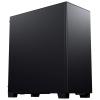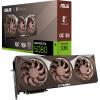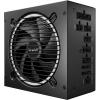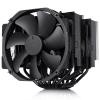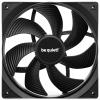Nobody likes a noisy PC, it can be annoying when you are trying to watch a movie, play games or simply browse the web! It's one of those things you don't really think about until you hear it, and the question we get asked often is - What parts do I use for a silent PC build?
There are many factors that can contribute to a noisy PC, and not all PCs can be made as quiet as others, depending on the use case. Most of the noise comes from moving parts as they attempt to cool components. The main causes are the CPU cooler, graphics card and the power supply fans. Vibration can also be a cause, so it's important to consider storage and chassis in our solutions too.
There is a lot of heat being generated by the components inside, and your PC needs to be cool in order to run effectively. This guide focuses on all of the best choices you can make for all of the components that make up your PC build, so it can be applied even if the PC is for high-performance gaming and/or editing.
You'll find most of these options in the Online System Builder Tool, so if you are wanting to design a quiet PC for yourself, you can continue to customise and create your own perfect build using the information below to maintain a quiet design!
Cases - Getting the right chassis makes a big difference
There are cases in the market that are designed for silent builds. These cases generally feature padded side panels and a solid front and top panel, which help dampen the noise from inside. They may also have rubber feet for elevation and stabilisation, or rubber pads in set locations such as the power supply and hard drive cages for your hardware, which will reduce vibration of parts. Popular brands Cooler Master, Corsair, Phanteks, FSP, NZXTall have options sporting these sorts of features at an affordable price.
Case fans - Cooling the whole PC
Case fans can also have a significant impact on the amount of noise your PC generates. The Noctua Cooling brand is a world favourite, their NF-F12 fans can be run in a semi passive mode, stopping at 0% PWM. There are 3 types of connectors for a fan, a Molex connector, 3 pin connector and a 4 pin connector. The 4 pin fans can be controlled via PWM and they are also capable at rotating at lower speeds. These can be controlled directly from your motherboard if connected into an active 4 pin header.
If you are connecting a fan with a Molex connector, it will always run at full speed which isn’t what you want if you are after a silent case. The 3 pin header is what most fans generally have, these can be controlled by adjusting the voltage supplied to the pin if your motherboard allows it, ASUS’s fan Xpert motherboard software does a great job with this.
If you are lacking fan headers you can get the Deepcool PWM fan hub which allows PWM control of additional fans, and up to 10 from a single fan header!
CPU Cooler - A wonderful way to reduce noise in most PC!
The main source of noise for most PCs will come from the CPU cooler. If you are still using the stock cooler that came with your CPU, you may want to consider getting a more efficient one. Air cooling is often the best way to go to keep noise levels down as AiO water cooling often leads to additional sounds coming from the pump, and also from the fans pushing air through the radiator.
For something that's effective in terms of cost, noise and cooling performance, an air cooler with a large fan is an ideal option if your case can fit them. Top picks are often CPU Coolers with large 140mm fans, with noise level averages between 19-23dB.
Of course, that 140mm fan could be tricky to install in a smaller tower PC chassis, so if that's the case, going with a Low Profile CPU Cooler is another good option.
An all-in-one water cooling kit can be great for performance, especially if you're running very high-end hardware, but as mentioned above, both the fans and pump will contribute noise. If you are opting for a water cooler, going with ones that feature large fans, such as a 140mm, 280mm and 420mm AiO Water Cooling are great, and with adjustable speeds via software control the performance/noise result can be excellent.
Power supply - Often overlooked but has a fan and can cause vibration
An inefficient power supply can lead to more energy consumption and more heat generated which means the fan needs to work harder. The 80 plus standard has set the benchmarks of what we can expect from different power supplies. If a power supply is 80 Plus certified you can be sure that 80% of the power used from the outlet will be used as power while the other 20% may be converted into heat. There is another group named Cybernetics who are doing similar certifications now also.
The rating system varies a bit with Bronze, Silver, Gold, Platinum & Titanium identifiers. The efficiency wobbles a little depending on total the power draw from your system, but to make it easy let's assume we're running at 100%.
80 Plus Bronze: PSU is rated for at least 82% efficiency at 100% load.
80 Plus Silver: PSU is rated for at least 85% efficiency at 100% load.
80 Plus Gold: PSU is rated for at least 87% efficiency at 100% load.
80 Plus Platinum: PSU is rated for at least 89% efficiency at 100% load.
80 Plus Titanium: PSU is rater for at least 90% efficiency at 100% load.
Also look for a larger fan on your power supply as larger fans can cool a lot more effectively while spinning less. Some power supplies will also have zero db fan modes which won’t operate the fan until a certain threshold is reached, some Corsair power supplies will have this feature such as the Corsair RM, AX and HX series.
Of course, that fan not spinning really only works if your PC isn't doing much heavy lifting, so the real solution for low noise under load is the bearing type, The most common types are ball bearing, sleeve bearing, and fluid dynamic bearings. The bearing type also affects performance and reliability but for the least noise, you’d want to go for the fluid dynamic bearings which are often used in the Cooler Master V Series, this series also features a 135mm fan making it perfect for silent builds.
The brand named be quiet! excels in this area. Their be quiet! Pure Power range of PC power supply units (PSU) all use Silent Wings fans, which in turn feature airflow-optimised fan blades to reduce turbulence, enabling best-in-class quiet functionality and the almost inaudible operation that be quiet! is famous for.
Optical (CD/DVD/BluRay), Mechanical HDD and Solid State SSD Drives
When reading and writing disks, your DVD drive can make a bit of noise and there isn't too much we can do about this, but hey, at least it's only when we are using it right! One option is to use an external USB optical drive, not really a solution, but you can place it further away from you on a padded surface to help with vibrations, which is nice.
Mechanical hard drives make quite a bit of noise as they have a lot of moving parts inside, you can go for the slower rpm drives which make less noise, such as 5400RPM Hard Drives.
SSDs are the perfect drives for a quiet PC as they don’t have any moving parts. Get an SSD, it's the smartest choice.
Graphics Cards Fans - Go BIG!
Ultra high-performance gaming graphics cards require a lot of power to run which generates a lot of heat and all of this needs to be managed. There isn’t too much you can do if you are running intense games but there are many graphics cards on the market which have zero fan action when temperatures are below a certain amount, which is featured in the majority of RTX ASUS ROG Strix, and Gigabyte AORUS models.
However, much like the 0Db PSU this becomes largely unusable if you're running the PC for anything heavier than web browsing, so going with the largest cooler design on your chosen series is a better way to keep noise as low as you can (it's still likely going to be the loudest component in your PC), consider the dual fan or even triple fan graphics card options available.
We'll continue to update this article with new PC Parts as they arrive and we hope this helps you on your quest to build a quiet PC. You'll find these options in the Online System Builder if you are wanting to design a quiet PC for yourself.


